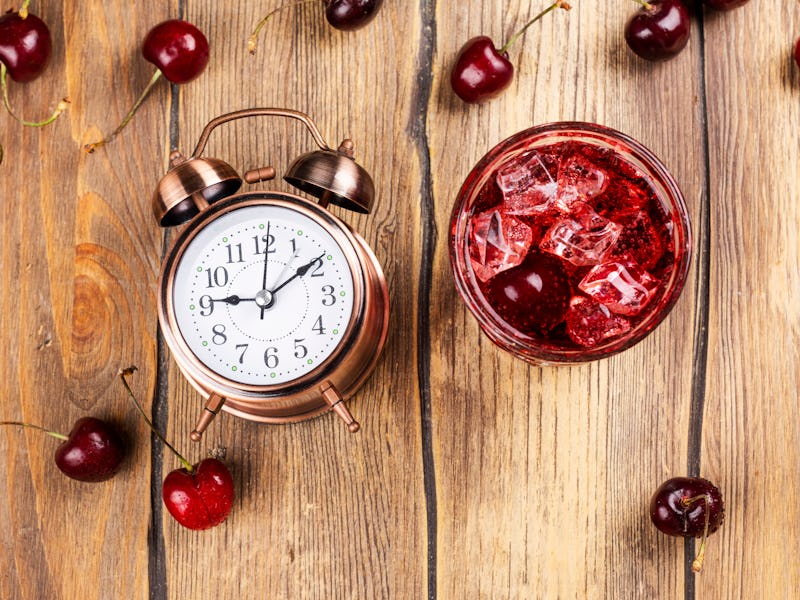Can this Common Element Cure America’s Sleep Problems?
Magnesium is one of the key ingredients of the viral “sleepy girl mocktail.” Here’s the science behind its purported sleep benefits.

For some of us, sleep isn’t a gentle drift into blissful slumber but a desperate plea to Morpheus himself for even an hour of shut-eye. If you’re among the millions of people in the US not getting enough zzz’s, you’re probably well familiar with purported sleep aides like melatonin or, in more recent years, cannabis.
The newest nightcap taking social media by storm is the “sleepy girl mocktail.” It’s a bright red drink consisting of three ingredients: Tart cherry juice mixed with some magnesium powder and topped with prebiotic soda or sparkling water for fizz.
The sleepy elixir made its first appearance on TikTok in 2023, but the ingredients are anything but new or revolutionary. Tart cherries are known to contain melatonin and tryptophan, an essential amino acid (meaning our bodies can’t make it) necessary for making melatonin, among many other biologically important molecules. There’s some evidence — such as this 2012 study in healthy adults and this 2018 study in older adults with chronic insomnia — that chugging the very sugary juice (an observation from this writer’s personal experience) may lull you to sleep.
However, when it comes to magnesium, the science behind its supposed sleepytime benefits is a bit iffy — suggesting maybe we should hold off lacing it into a nightly mocktail.
Inconclusive findings
Magnesium is a mineral found abundantly in the body that’s involved in over 300 different physiological processes like synthesizing DNA and proteins, muscle contraction, and controlling blood sugar levels.
A deficiency in this mineral is believed to be tied to sleep disorders like insomnia, possibly by disrupting sleep-wake cycles, as some animal studies have found. However, a true magnesium deficiency is pretty rare; many animal and plant sources contain the mineral (even dark chocolate!), so it's hard not to get enough of it if you’re eating an otherwise healthy, well-rounded diet. A magnesium deficiency also comes with other serious symptoms such as loss of appetite, fatigue, nausea and vomiting, and, more life-threatening, irregular heartbeats and tremors, but thankfully is easily treated.
Whether supplementing magnesium improves sleep, the evidence is far from conclusive, with most studies too small or poorly designed to provide definitive answers.
A 2021 systematic review of clinical trials to date investigating magnesium for sleep, particularly among older adults with insomnia, concluded the trials suffered from “moderate-to-high risk of bias and outcomes were supported by low to very low quality of evidence.” Another review conducted in 2022 acknowledged while magnesium supplementation seemed to work in a handful of observational studies, it didn’t hold up in randomized clinical trials.
“The association between dietary magnesium and sleep patterns needs well-designed randomized clinical trials with a larger sample size and longer follow-up time (more than 12 weeks) to further clarify the relationship,” the authors of that review wrote.
If you have restless leg syndrome, a condition characterized by an uncontrollable urge to move your legs that typically happens a night, magnesium supplements could theoretically help with sleep by relieving the associated discomfort. But again, the science isn’t conclusive. A 2019 systematic review of available clinical studies published in the journal Sleep Medicine Reviews didn’t find any clear evidence of magnesium relieving or benefiting people with restless leg syndrome or periodic limb movement disorder, where you experience muscle cramps or jerky legs during sleep.
Should you quit magnesium?
While taking supplementary magnesium daily isn’t advised unless you have a medical reason, there’s no real harm as long as it’s within a safe range, which varies depending on age, gender, and pregnancy status. According to WebMD, the recommended daily allowance for adult women over 31 years of age is 320 milligrams per day (310 milligrams for those between ages 19 and 30); for adult men over 31, it’s 420 milligrams per day (400 milligrams between ages 19 and 30).
Magnesium isn’t benign if you overdose it — which can cause gastrointestinal issues, muscle weakness, and low blood pressure (some people are more at risk of developing magnesium toxicity) — and if you’re using it to self-treat chronic sleep issues that could be due to other factors, like poor sleep hygiene or an underlying health condition. You should consult a medical professional if not getting adequate or enough sleep is an ongoing, persistent problem instead of taking matters into your own hands.
If you’ve tried the sleepy girl mocktail and swear by it, in no way is this an attempt to deny you a good night’s sleep. But as with all things pertaining to the well-being of our bodies, drink responsibly.
This article was originally published on